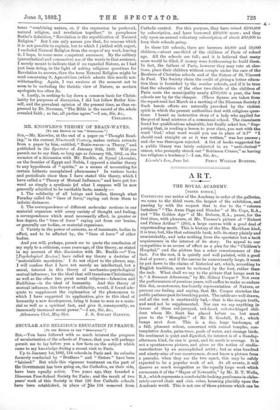SECULAR AND RELIGIOUS EDUCATION IN FRANCE.
[To THE EDITOR OF THE " SPECTATOR."] 'SIR,—You have followed with so much interest the progress of secularisation of the schools of France, that you will perhaps permit me to lay before you a few facts on the subject which came to my knowledge during a recent visit to Paris.
Up to January 1st,1882, 134 schools in Paris and its suburbs formerly conducted by " Brothers " and " Sisters " have been "laicised." But while this vigorous treatment on the part of the Government has been going on, the Catholics, on their side, have been equally active. Two years ago, they founded a Diocesan Free-School Society for Paris ; and the result of two years' work of this Society is that 126 free Catholic schools have been established, in place of :the 134 removed from
Catholic controL For this purpose, they have raised £200,000 by subscription, and have borrowed £80,000 more ; and they rely upon an. annual voluntary subscription of about £80,000 to keep their schools going.
In these 126 schools, there are between 40,000 and 50,000 children,—about one-third of the children of Paris of school age. All the schools are full ; and it is believed that many- more would be filled, if money were forthcoming to build them- In fact, the fathers of Paris, however they may vote at elec- tions, place their children without scruple under the care of the Brothers of Christian schools and of the Sisters of St. Vincent de Paul. The Society claim the credit of giving a better educa- tion than is furnished by the secular schools, and if it be true that the education of the other two-thirds of the children of Paris costs the municipality nearly £700,000 a year, the free schools are by far the cheaper. (These figures are taken from the report read last March at a meeting of the Diocesan Society.) Such heroic efforts are naturally provoked by the violent spirit in which the present authorities deal with religious ques- tions. I heard an instructive story of a lady who applied for the post of head mistress of a communal school. The examiners found her qualifications admirable, but finally asked her, " Sup- posing that, in reading a lesson to your class, you met with the word ' God,' what word would you use in place of it P" "I should read straight on as it was written," was her answer; and she was thereupon rejected. A list of books suggested for a public library was lately subjected to an " anti-clerical '" censor, who promptly struck out " Robinson Crusoe," as having too religious a tendency !—I am, Sir, Sic.,














































 Previous page
Previous page